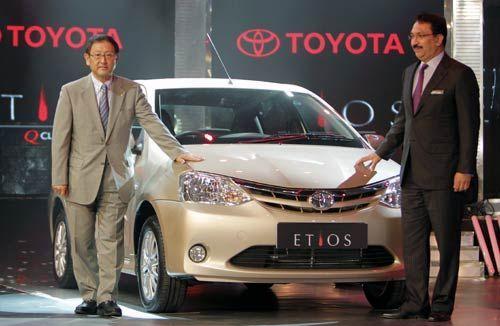* Text/Spades with long sword
After dominating the world in the era of fuel vehicles, Japanese auto giant Toyota is trying to regain its prestige in the era of electric vehicles — at least, it is trying to do so in the Indian market. Recently, its Indian subsidiary Toyota Kirloskar Motor issued a statement saying that it plans to invest 48 billion rupees (about $624 million) in the company's carbon reduction efforts in India.
This is part of Toyota's strategy for India. That follows a production site in the southern state of Katanak, where it plans to focus on manufacturing components for electric vehicles — hybrids, to be precise — and on official social media, Toyota's Indian subsidiary hinted in a video that it would launch a new hybrid car in the near future.
And that's exactly what happened: Toyota chose hybrids rather than pure electric vehicles as its pioneer in India, and it firmly believes that such a strategy can be a huge success.

Vikram Kirloskar, vice chairman of Toyota's Indian subsidiary, said in a previous interview that in a country where 70 percent of electricity comes from coal-fired power plants, "strong hybrids produce the least amount of carbon emissions." ”
Not only Toyota, but also the promotion of hybrid vehicles in India seems to be a common strategy adopted by all Japanese car companies. In fiscal 2023, Honda plans to launch a hybrid city sedan, its factory in Rajasthan has already begun production, and Suzuki, which has been in the Indian fuel vehicle market for a long time, also intends to move into the hybrid field, and its planned model may be a hybrid SUV.
The practicality of hybrid technology is a point that Japanese manufacturers have been talking about. Takuy a Tsumura, president of Honda's Indian subsidiary, has publicly stated that hybrid cars can provide users with more anxiety-free driving time, "which is indeed the most practical and best solution at present." ”
In addition, they believe that the introduction of hybrid vehicles can make EV components more localized, making it easier to reach a larger user base.
The advantages of hybrid vehicles are unquestionable, but their disadvantages are also worth paying attention to - in the Indian market, the subsidy policy for electric vehicles has become more refined, and today's Indian government prefers pure electric vehicles, and the attitude towards hybrid vehicles is increasingly cold.
Previously, the First Subsidy Scheme introduced by the Indian government, FAME, discriminated against hybrids and electric vehicles, which eventually led to the rampant development of small hybrid vehicles in the Indian market and increased carbon emissions in disguise. Because of this, the second subsidy scheme, FAME II, draws on the experience of the previous one and significantly reduces the hybrid vehicle subsidy. In this subsidy policy, the ex-factory price of hybrid vehicles must not be higher than 1.5 million rupees.
Taxes and fees are another factor that is not conducive to the continued development of hybrid vehicles. After the implementation of the unified GST tax in India in 2017, in order to make up for the losses of the states, the Indian government added an additional tax on the basis of the 28% basic tax on the car, which directly led to the tax rate of hybrid vehicles reaching a maximum of 43%, which is consistent with the tax on a medium and large fuel vehicle.
In contrast, the all-electric vehicle tax rate under GST has been reduced from 20.5% to 12%.
Under the pressure of GST, the cost of high tax rates will be almost all reflected in the price without reservation, which also makes it extremely difficult for hybrid models to meet the subsidy standards of the Indian government, while pure electric vehicles can enjoy extremely low tax rates and preferential subsidy policies. If Japanese car companies want to open up the Indian market with hybrid models, they need to negotiate tax rates with the relevant Indian authorities, which is obviously extremely difficult - Tesla has previously hinted at the Indian government to reduce auto import tariffs, but has not been able to agree.
On the other hand, India's local car companies have invested a lot of enthusiasm in pure electric vehicles, a typical example is Tata Motors, in the overall sales of pure electric vehicles in India in March this year, Tata's sales data is 3387 vehicles, accounting for 94.40% of the market share, and the next brands are SAIC MG, Mahengda, Hyundai, BYD and Audi.
It is not difficult to find that none of them has the name of a Japanese car company.
At present, Japanese car companies still have no willingness to switch to the field of pure electric in the short term, and there will not be too much time left for them to choose. Take Suzuki, which focuses on small cars, which was once india's best-selling brand, but in the last fiscal year, its share of the auto market has shrunk to 43%, counting the past three fiscal years, Suzuki has lost more than 8% of the market share; at the same time, Tata Motors, Kia and other car companies are growing rapidly.
If Japanese car companies still use "India is not yet suitable for the development of pure electric vehicles" as a reason, they are likely to eventually lose their head in the rapidly changing pure electric vehicle market, and at the same time, due to strict (and I am afraid that it will be more stringent in the future) subsidy policies and taxes, it may be difficult for them to make any money in the Indian market. In the end, the fate of Japanese car companies may fall to the same point as Ford, General Motors and other American car companies, or even worse - forced to withdraw from the local area.
*Image courtesy of Yandex